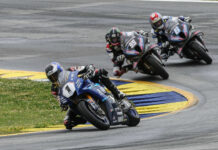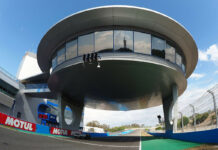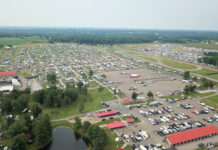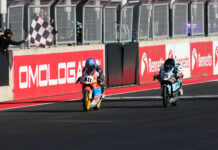Copyright 2003, Roadracing World Publishing, Inc.
By Dennis Noyes
We gathered from the presentation of our Troll Honda BQR press release yesterday on Kenny Noyes’ results from the Spanish National Formula Extreme Championship (CEV), that your readers might be interested to know a bit more about the Dunlop-only regulations which apply in the Bancaja Fórmula de Campeones series which shadows the CEV regulations in every aspect except in tires and brakes. The CEV is open to all tire manufacturers and allows aftermarket competition brakes, but no carbon carbon discs.
Here are the basic facts:
In Spain the top series of racing is the CEV Fórmula Extreme which is extreme in name only. In fact Dorna, the rights holders for the national series, has adopted rules which are basically Superstock or standard production, allowing the rear shock to be changed, brakes to be changed and increased compression (but no internal headwork) and ignition mapping changes. Pistons, cams, valves, valve springs, rods–everything must be standard. Front forks must be stock externally, but internal components can be changed.
Other than adding a pipe and eliminating lights and other road legal running gear, the Spanish CEV machines are very mildly prepared 1000cc road bikes. The results of the Championship so far reflect what magazine road tests would have predicted–domination by the Suzuki GSX-R1000 with opposition from the Yamaha YZF-R1 and with the Honda CBR954RR and Ducati 999 running off the winning pace. Racing is very close. At Albacete yesterday the first 24 bikes on the 36-machine grid were all covered by 2.4 seconds in qualifying with the first eight within 0.8-second. After 19 laps and 34 minutes of racing only four of the 26 finishers were lapped (two of those had run off into the gravel and returned), but the first 16 finishers were all on “development” tires from Dunlop, Michelin and Pirelli. Winner José David de Gea (Suzuki) is a Dunlop runner as is third-place finisher José Oriól Fernández (Suzuki) while second-place finisher José Luis Cardoso (Yamaha) is on Michelin.
The CEV National Series is supported by top Spanish Grand Prix teams and sponsors, and is broadcast live on Spain’s TVE-2, the country’s prime carrier of sporting events. Crowds run around 10,000 per race, not bad for a country that has three Grands Prix plus a round of World Superbike and World Endurance and the 24 Hours of Catalunya.
The noble idea of a level playing field for all is firmly supported by the Spanish Federation which frequently tears machines down after races and recently disqualified European 250cc Champion Álvaro Molino for running an aftermarket Yoshimura clutch cover on his Suzuki, even though he had been told initially by a federation official that the piece was legal. The RFME (Spanish federation) ruling was that the letter of the law as stated in the rules overrides personal judgments by federation officials. Any technical regulation infringement results in automatic disqualification with loss of points and prize monies.
Against this background of stern enforcement to guarantee equality of opportunity there is the tire factor. Michelin supplies top-of-the-line tires to the Laglisse Yamaha D’Antin team but standard “product” to the rest of the paying teams.
Dunlop offers broader support, supplying the best development tires to several top teams and occasionally giving their best new development offerings to riders on “product” who put in unusually strong qualifying performances.
Pirelli supplies development tires to Folch Endurance Yamaha and Procurve Honda and also rewards Pirelli privateers with special tires on occasion. (The Folch Endurance Yamaha R1 finished third in the Spanish round of the World Endurance Championship at Albacete on Pirellis behind the Zongshen 1 and Zongshen 2 Suzuki GSX-R 1000s on Dunlop.)
The organizer of the Bancaja Fórmula de Campeones is the Circuit Ricard Tormo of the Community of Valencia. It is a National Championship series run under RFME sanction for the purpose of developing young talent. The three major classes are 125cc Aprilia, Supersport and Fórmula Extreme. In order to eliminate the considerable advantage that riders with special-compound tires enjoy in the CEV, the organizer offered exclusivity deals to the major tire companies and came to an agreement with the Dunlop Spain importer, Zaqatín, to supply spec tires to all three classes.
Bancaja, a major Valencian bank, sponsors the series and buys TV time for highlight coverage of the three major classes. The series is directed by former 125cc GP rider Julían Miralles who also directs the MIR team in World Superbike and European Superstock.
Regulations for the premier Motociclismo Superseries class (sponsored by Motociclismo magazine of Madrid), for 1000cc production machines are identical to the CEV Formula Extreme regulations except for the exclusive use of Dunlop tires (Dunlop is exclusive supplier to the 125cc and Supersport classes as well) and the fact that standard brakes and calipers must be retained in the Bancaja series.
In 2002 the 1000cc class ran on treaded DOT Dunlops, but this year DOTs are used only in Supersport while spec production Dunlop slicks are used in the 125cc and 1000cc Superseries classes.
Dunlop brings different compounds to different races according to the surface, the time of the year and availability. At the opening two rounds this year two fronts (701 and 587) and two rears (956 and 902) were available. Development tires are not allowed, but riders may use any “product” tire offered by Dunlop in Spain. Tires are not bar-coded as in WSBK but Dunlop technicians ride herd over the field to make sure that only spec “product” tires are used.
So far two rounds have been run, both won by José Hurtado on a GSX-R Suzuki. The only rider to threaten Hurtado so far has been Spanish-born American Kenny Noyes on a CBR954RR Honda, second by a (Dunlop) tire width at Valencia, but absent from the second round due to team obligations in the 24 Hours of Catalunya where the BQR team ran as high as second in the early going before a couple of crashes by the team’s second rider left the bike too badly bent to continue.
“Last year was my first riding Fórmula Extreme in Spain and I was on “product” Michelin tires which are nothing like the good stuff,” explained Kenny. “But I entered a round of the Bancaja series in Cartegena and for the first time I was on the same tires as everybody else and all of a sudden I found I could run with guys who were taking a couple a seconds a lap from me in the CEV! We were on DOTs Dunlops and sliding around a lot, but I like that coming from dirt track. This year we are all on Dunlop slicks, which is better for the racing, and I was third in Cartagena and just got beaten at the line in Valencia this year. It gave me a big confidence boost to know just how much difference having the same tires meant. Recently I’ve been getting top Dunlops in the CEV, but I still run the Fórmula de Campeones whenever there is no conflict because it’s great racing where the whole matter of tires is pretty much neutralized. Now if we could just get them to slow those Suzuki GSX-Rs down a little we’d be there!”
Says team director Julian Miralles, “We like the European Superstock rules which require spec Pirelli tires and we prefer to develop riders in Spain in the spec Dunlop Bancaja races. An advantage in tires means so much and falsifies the true level of the riders so much that we think open competition between tire manufactures should only take place at Grand Prix level. Anyway if you look at MotoGP you see that except for a couple of teams everyone is running the same Michelin tires anyway.”
At Laguna Seca on July 11th Maurizio Flammini announced that the all three classes of the championships organized by FGSport, World Superbike, World Supersport and European Superstock, will run on spec tires next year. “We do not feel that a tire supplier should become the determining factor in races that are intended to match rider against rider and model against model, especially when a manufacturer like Michelin supplies only one team with its best tires.” (It seems that the manufacturer will be Pirelli but that has not yet been confirmed.)
The Bancaja Fórmula de Campeones came to that conclusion two years ago and there are some in the Spanish federation who think a spec tire rule might also be the best way to go in all National Championship production-based classes.
More On Spec Tires In Spain
More On Spec Tires In Spain
© 2003, Roadracing World Publishing, Inc.






